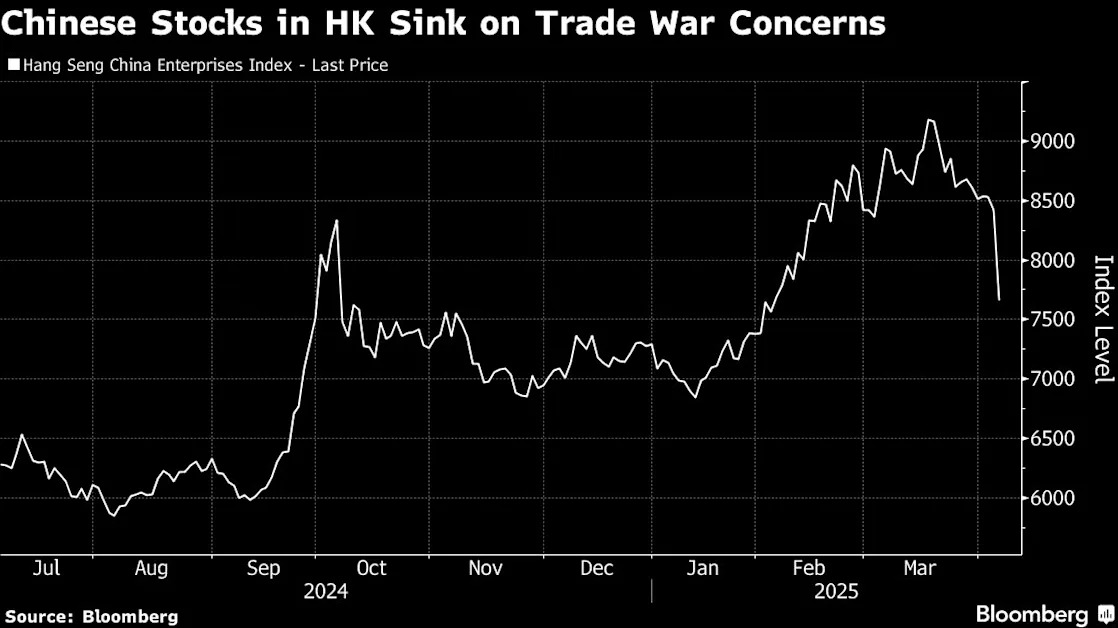Chinese Stocks Suffer ‘Panic Selling’ as Tariff War Escalates
(Bloomberg) -- Chinese shares plunged and sovereign yields neared an all-time low as investors braced themselves for the fall-out from a spiraling trade conflict between the world’s two largest economies.
Most Read from Bloomberg
A closely-watched gauge of Chinese shares listed in Hong Kong tumbled 13.8%, putting it into a bear market. Hong Kong’s Hang Seng Index had its worst day since 1997, wiping out all of its gains for the year. The onshore CSI 300 lost 7.1% of its value. The Nasdaq Golden Dragon China Index declined as much as 6.6%, with Alibaba Group Holding Ltd. losing more than 9% after trading opened in New York.
China’s retaliation against US President Donald Trump’s sweeping tariffs is forcing investors to confront the reality that a much-feared trade conflict has entered a new phase. Beijing has tried to limit the damage: officials are discussing frontloading potential stimulus to offset the impact of tariffs and a state-backed fund said it had increased its investments in exchange-traded funds to stabilize the market — but so far, investors are focusing on the potential for economic disaster.
“This selloff we see is incredible for all the wrong reasons,” said Sat Duhra, a portfolio manager at Janus Henderson Investors. “There is an element of panic selling, of course; there are margin calls we need to be aware of; funds are selling down to raise cash and China retaliation has introduced more risk with a currency devaluation now on the table in the eyes of investors.”
The selloff created a frenzy in Hong Kong, where stock turnover hit a record of HK$621 billion ($80 billion) on Monday.
The flight from risk cut across all sectors and markets. Shares of all 50 companies in the Hang Seng China Enterprises Index declined, and a gauge of Chinese tech stocks in Hong Kong fell more than 17%. Chinese bond issuers were among the names leading losses across Asia on Monday, with spreads on some of their investment-grade notes widening as much as 40 basis points, according to traders.
“The global trade system for the past ninety years is collapsing, leaving it difficult for people to forecast the economic impact and tell where the bottom for a market is,” said Vincent Chan, a China strategist at Aletheia Capital Ltd. “If you want to take liquidity out of the system, Hong Kong is the first to hit and there are also a lot of profits to take after this year’s rally.”
Government bonds surged as investors flocked to the safest assets available amid fears about the impact of tariffs on China’s economy. The benchmark 10-year yield slid eight basis points to near the lowest level on record, amid a wave of buying at every major maturity.
In the foreign-exchange market, the People’s Bank of China weakened its daily reference rate for the yuan to a level unseen since December. That could be a signal that Beijing is willing to support growth by devaluing its currency, potentially making it an important tool in the trade war.
Analysts at Wells Fargo & Co. say there is a risk Beijing could deliberately weaken the yuan by up to 15% over a two-month period, while those at Jefferies Financial Group Inc. see the possibility of a 30% move.
China’s offshore yuan weakened around 0.2% against the dollar, even as the People’s Bank of China set the currency’s daily reference rate at a level much stronger than expected.
‘Strained Voices’
China urged resilience as the selling pressure spread on Monday, with a state-owned newspaper calling for citizens to “turn pressure into motivation.”
But investors appear to be waiting for more action from Beijing, with attention once again turning to the potential for stimulus to help boost the world’s second-largest economy. Stimulus hopes could ensure that the stock rout is quickly followed by a bounce. Retail investors may wade into the market later this week, treating the selloff as an opportunity to buy the dip, said Kenny Wen, head of investment strategy at KGI Asia Ltd.
“We see some bottom fishing now,“ said Andy Maynard, head of equities at China Renaissance. Still, “people are bewildered as to next steps because it’s hard to predict what will happen. I think most are exiting their positions and will be extra cautious to add back.” Southbound buying of Chinese stocks listed in Hong Kong was around HK$15 billion, according to Bloomberg-compiled data.
The sharp moves in Chinese markets came as investors had their first chance to digest Beijing’s response to the US tariffs, which were announced during a market holiday on Friday. Chinese officials matched the reciprocal tariffs the US imposed on the country.
Read: China Hits Back at Trump With Tariffs, Limits on Key Exports
The rapid response was a surprise to some investors and has raised concerns that the US might hike its China tariffs again. That could lead to a series of tit-for-tat moves, a potential disaster for the global economy. The retaliation made Beijing an outlier among other Asian nations, with multiple governments in the region expressing their hopes of reaching a deal with the White House. Still, that didn’t spare their stock markets on Monday: Equities across the region plummeted amid a broad flight from risk.
“Quite a few shrill and strained voices on the trading floor this morning, and quite honestly I couldn’t recall seeing a 8% fall in the normally stable STI, nor a 2000-point fall in HSI in a long time,” said Kok Hoong Wong, head of institutional equities sales trading at Maybank Securities, referring to the Singapore and Hong Kong stock benchmarks. “This level of panic can only be compared to the selloffs in the depth of Covid.”
--With assistance from Winnie Hsu, Tian Chen, John Cheng, Ameya Karve, April Ma, Charlotte Yang and Yiqin Shen.
(Updates with share-price moves at open.)
Most Read from Bloomberg Businessweek
©2025 Bloomberg L.P.
